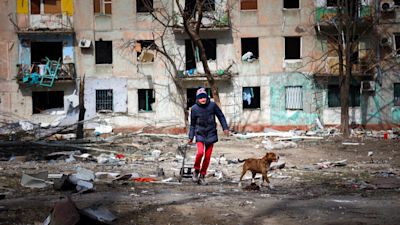Zelenskyy dismisses Russia's pledge to scale back saying 'the enemy is still in our territory'

ITV News Global Security Editor Rohit Kachroo reports from Kyiv as Russian shelling continues to hit Ukraine's capital
Russia's announcement it would significantly scale back military operations near Ukraine’s capital and a northern city have been dismissed by Ukraine's president after reports of heavy bombardments overnight in some areas.
Volodymyr Zelenskyy said he did not "see any basis for trusting" the Russians' words, adding Moscow's pledge to cut back military activity "don't silence the explosions of Russian shells".
After talks aimed at ending the more than month long war in Istanbul on Tuesday, Russia said it would reduce “military activity in the direction of Kyiv and Chernihiv" in what appeared to be the first major concession the Russians made since the beginning of their invasion in Ukraine more than a month ago.
But just hours after talks ended, Russian forces have struck areas around Kyiv and Chernihiv overnight, local officials said.
Ukrainian officials said Russian shelling hit homes, shops, libraries and other “civilian infrastructure”.
The continued attacks appeared to confirmed fears that Russia's announcement may have been an attempt by Moscow to buy time to continue its assault, with Western officials believing the Kremlin is reinforcing troops in the Donbas region in a bid to encircle Ukraine’s forces.
Russian Defence Ministry spokesman Maj. Gen. Igor Konashenkov said on Wednesday the military targeted fuel depots in two towns in central Ukraine with air-launched long-range cruise missiles and hit a Ukrainian special forces headquarters in the southern Mykolaiv region along with two ammunition depots in the eastern Donetsk region.
Mr Zeleskyy met Moscow's pledge with scepticism, saying "Ukrainians are not naive people” and they were still be bombed by Putin's forces in their homes.
“The enemy is still in our territory,” he said. “The shelling of our cities continues. Mariupol is blocked. Missile and airstrikes do not stop. This is the reality. These are the facts.”
“Yes, we can call those signals that we hear at the negotiations positive. But those signals don’t silence the explosions of Russian shells,” Mr Zelenskyy said.
“Of course we see the risks. Of course we don’t see any basis for trusting the words voiced by those or other representatives of the state that is continuing to fight for our destruction.
“Ukrainians have already learned during the 34 days of the invasion and during the past eight years of war in the Donbas that you can trust only concrete results.”
Western leaders also called for caution over Russia's claim that it will "fundamentally cut back" operations outside the Ukrainian capital of Kyiv.
“We will judge Putin and his regime by his actions, not by his words,” a spokesperson for Boris Johnson said.
While the British Ministry of Defence said Russia's stated focus on the separatist regions in eastern Ukraine “is likely a tacit admission that it is struggling to sustain more than one significant axis of advance.”
It said heavy losses have forced some Russian units to return to Belarus and Russia to regroup but that Moscow would likely compensate for any reduction in ground manoeuvres by using mass artillery and missile barrages.
Talks are expected to resume on Wednesday, five weeks into a war that has killed thousands and forced more four million people to flee Ukraine.
The Ukrainian delegation laid out a possible framework for a future peace deal based on third-party security guarantees which mean other countries would intervene if it was attacked in the future.
They said Ukraine prepared to declare its neutrality, as Moscow has demanded, not to join NATO and to hold talks over the next 15 years on the future of the Crimean Peninsula, which Russia annexed in 2014.
For expert analysis of this topic, listen to the Ukraine episodes of the What You Need To Know podcast